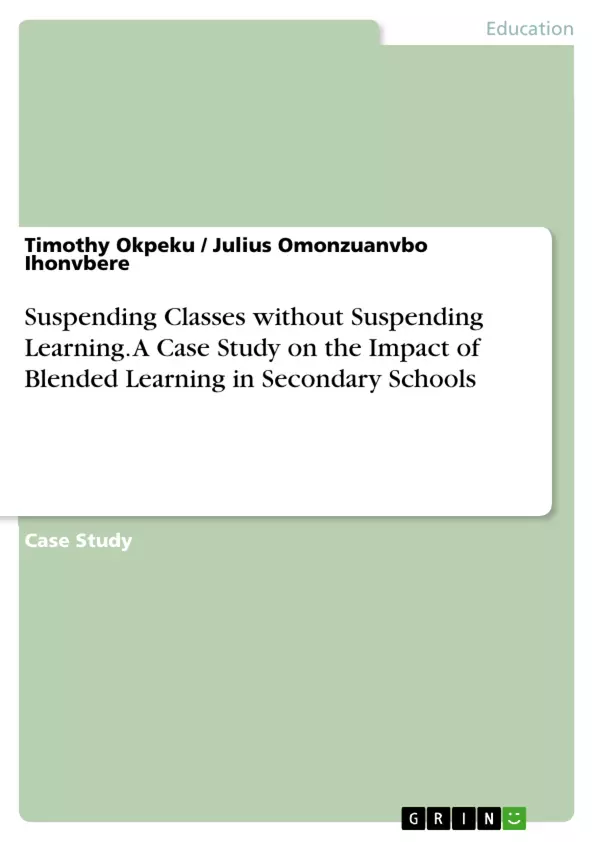In a world grappling with educational disruptions, particularly in regions facing infrastructural limitations, does blended learning hold the key to unlocking consistent academic progress? This pivotal study delves into the Nigerian secondary education system, dissecting the effectiveness of technology-enhanced instruction and its impact on student achievement amidst the challenges of school closures and fluctuating academic performance. Drawing upon data from the West African Senior Secondary School Examination (WASSCE) between 2015 and 2023, this research meticulously examines the experiences and perceptions of both teachers and students regarding blended learning strategies. It grapples with critical questions surrounding teacher preparedness in utilizing educational technology, the availability of adequate ICT infrastructure, and the pressing issue of the achievement gap exacerbated by factors like the COVID-19 pandemic. By employing rigorous methodologies, including Z-test analysis, the study uncovers nuanced insights into the relationship between technology access, teacher training, and student outcomes. This exploration goes beyond surface-level observations, venturing into the heart of digital literacy, instructional strategies, and the transformative potential of integrating online and offline learning methods. Discover how blended learning can serve as a catalyst for bridging the educational divide, fostering resilience in the face of adversity, and ultimately, empowering the next generation of Nigerian scholars. Uncover the recommendations for policymakers, educators, and stakeholders seeking to leverage technology to create more equitable and effective learning environments, paving the way for sustainable educational development in Nigeria and beyond. Understand the intricacies of blended learning, the obstacles hindering its seamless implementation, and the innovative solutions that can revolutionize secondary education in resource-constrained settings. Gain invaluable knowledge about the future of education in Africa, where technology and tradition converge to shape a brighter tomorrow for students and communities alike. Explore the potential of blended learning to transform educational outcomes and address the systemic challenges hindering academic progress in the region.
Inhaltsverzeichnis (Table of Contents)
- Introduction
- Problem Statement
- Research Questions
- Methodology
- Research Design
- Analysis of Result
- Z-test Analysis
- Summary of Results
- Interpretation and Discussion of Findings
- Recommendations
Zielsetzung und Themenschwerpunkte (Objectives and Key Themes)
This study aims to investigate the impact of blended learning in Nigerian secondary schools, focusing on how to maintain learning continuity even when face-to-face classes are suspended. It explores teachers' and students' perspectives on blended learning's effectiveness and identifies challenges related to its implementation.
- The effectiveness of blended learning in maintaining academic progress during school closures.
- Teachers' preparedness and skills in utilizing technology-enhanced blended learning.
- Students' experiences and perceptions of blended learning as an instructional strategy.
- The relationship between technology access, teacher training, and student academic performance.
- Addressing the achievement gap among secondary school students in Nigeria.
Zusammenfassung der Kapitel (Chapter Summaries)
Introduction: This chapter sets the stage by highlighting the issue of inadequate access to technology-enhanced blended learning in Nigeria and its negative impact on students' academic performance. It uses data from the West African Senior Secondary School Examination (WASSCE) results from 2015 to 2023 to illustrate fluctuating performance levels, particularly the dip in 2020 due to COVID-19 related school closures. The introduction emphasizes the importance of integrating online and offline learning methods to improve educational outcomes, especially given the challenges of limited ICT infrastructure in Africa. It also reviews existing literature on the benefits and challenges of technology-enhanced instruction in various contexts, creating a foundation for the study's research question and methodology.
Schlüsselwörter (Keywords)
Blended learning, technology-enhanced instruction, secondary education, Nigeria, student achievement, teacher preparedness, COVID-19, WASSCE, digital literacy, educational technology, achievement gap.
Frequently Asked Questions
Was ist das Ziel der Studie?
Diese Studie zielt darauf ab, die Auswirkungen von Blended Learning in nigerianischen Sekundarschulen zu untersuchen. Der Fokus liegt darauf, wie die Lernkontinuität aufrechterhalten werden kann, selbst wenn Präsenzveranstaltungen ausgesetzt sind. Sie untersucht die Perspektiven von Lehrern und Schülern hinsichtlich der Wirksamkeit von Blended Learning und identifiziert Herausforderungen im Zusammenhang mit dessen Implementierung.
Welche Themenschwerpunkte werden in der Studie behandelt?
Die Studie konzentriert sich auf folgende Schwerpunkte:
- Die Wirksamkeit von Blended Learning bei der Aufrechterhaltung des akademischen Fortschritts während Schulschließungen.
- Die Bereitschaft und Fähigkeiten der Lehrer bei der Nutzung technologiegestützten Blended Learning.
- Die Erfahrungen und Wahrnehmungen der Schüler von Blended Learning als Unterrichtsstrategie.
- Die Beziehung zwischen Technologiezugang, Lehrerausbildung und akademischer Leistung der Schüler.
- Die Bekämpfung der Leistungsunterschiede zwischen Sekundarschülern in Nigeria.
Was behandelt die Einleitung der Studie?
Die Einleitung beleuchtet das Problem des unzureichenden Zugangs zu technologiegestütztem Blended Learning in Nigeria und dessen negative Auswirkungen auf die akademische Leistung der Schüler. Sie verwendet Daten der West African Senior Secondary School Examination (WASSCE) Ergebnisse von 2015 bis 2023, um schwankende Leistungsniveaus zu veranschaulichen, insbesondere den Rückgang im Jahr 2020 aufgrund von COVID-19 bedingten Schulschließungen. Die Einleitung betont die Bedeutung der Integration von Online- und Offline-Lernmethoden zur Verbesserung der Bildungsergebnisse, insbesondere angesichts der Herausforderungen der begrenzten IKT-Infrastruktur in Afrika. Sie gibt auch einen Überblick über die bestehende Literatur zu den Vorteilen und Herausforderungen technologiegestützten Unterrichts in verschiedenen Kontexten und schafft eine Grundlage für die Forschungsfrage und Methodik der Studie.
Welche Schlüsselwörter sind relevant für diese Studie?
Schlüsselwörter: Blended Learning, technologiegestützter Unterricht, Sekundarbildung, Nigeria, Schülerleistungen, Lehrervorbereitung, COVID-19, WASSCE, digitale Kompetenz, Bildungstechnologie, Leistungsunterschied.
Was beinhaltet die Analyse der Ergebnisse?
Die Analyse der Ergebnisse beinhaltet eine Z-Test Analyse.
Was passiert mit den Ergebnissen?
Die Ergebnisse werden zusammengefasst und interpretiert. Es gibt auch eine Diskussion über die Ergebnisse, gefolgt von Empfehlungen.
- Quote paper
- Timothy Okpeku (Author), Julius Omonzuanvbo Ihonvbere (Author), 2023, Suspending Classes without Suspending Learning. A Case Study on the Impact of Blended Learning in Secondary Schools, Munich, GRIN Verlag, https://www.grin.com/document/1417532



